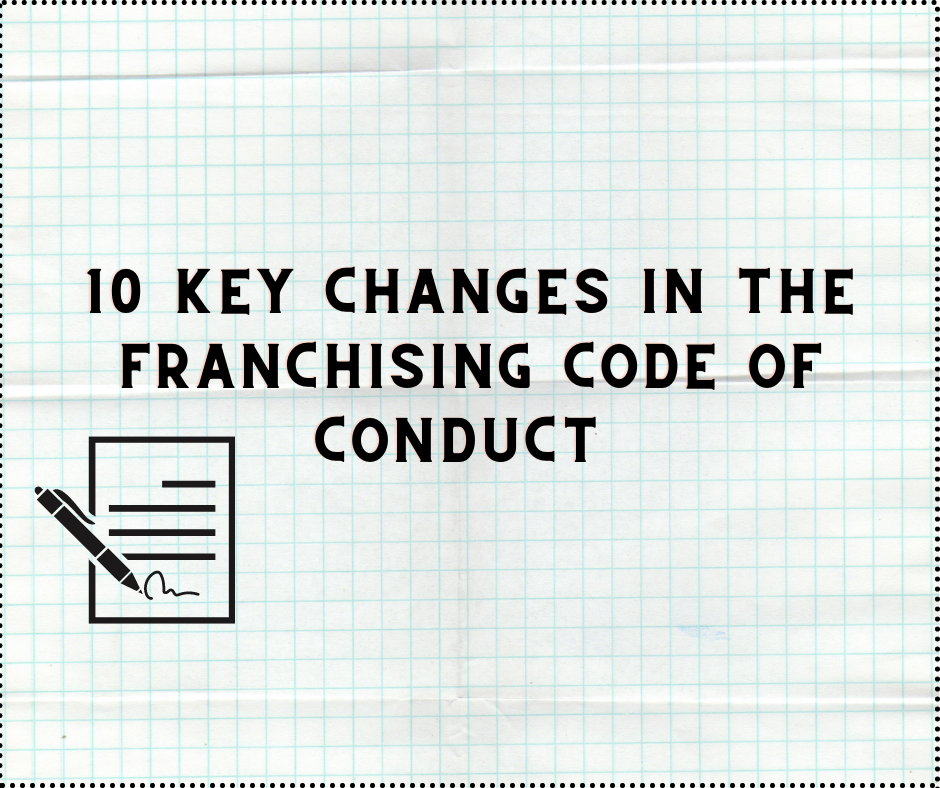As we embrace the beginning of the new financial year, we see a number of policy changes come into effect in the healthcare, superannuation, and franchising sectors. Whether you’re an existing Franchisor or Franchisee, or considering franchising your business or entering into a franchise agreement, it is essential you are aware of the changes to the Franchising Code of Conduct, and how they may impact your business, rights and options going forward.
We know that it’s an arduous process navigating through the copious amounts of information, so here at Franchise Ready we’ve done it for you, and summarised the amendments into 10 Key Changes.
What is the Franchising Code of Conduct?
Before we dive into the details of the amendments, we’ll quickly refresh your memory. The Franchising Code of Conduct refers to the industry code which regulates the conduct of Franchisors and Franchisees. Enforced by the ACCC, the Franchising Code details various conditions and requirements which are to be upheld by both parties to facilitate fair and fruitful Franchise arrangements.
A recent parliamentary enquiry into the Franchising sector reinforced the inadequacies of the existing Code of Conduct, provoking a series of amendments, which largely came into effect on the 1st July 2021. The changes, which pertain to increased disclosure obligations, penalty increases, and enhanced dispute resolution options, attempt to address the perceived power imbalance between Franchisees and Franchisors.
How does this impact me?
Whether you’re an existing Franchisor, or a Franchisee, or considering your first step into a franchising space, the various changes, which we’ll identify in a moment, are extremely important, and here’s why.
Franchisors
As a Franchisor, you should familiarise yourself with the amendments to ensure your new and existing Franchising agreements are compliant with the updated Code of Conduct.
Failure to comply can result in penalisation, with the amendment doubling the non-compliance penalty from 300 to 600 units. Given one penalty unit = $222, the maximum penalty amount has now increased to $133 200.
Franchisees
As a Franchisee, you should welcome the Franchisee- Friendly changes, as they grant you additional rights and powers, making it easier for you to understand, enter, and terminate the relationship.
10 Key Changes in the Franchising Code of Conduct
Now that you understand What the Code of Conduct is, and Why it matters, here are 10 Key Changes, and what they mean for you.
To ensure you understand exactly where the changes will come into play, we’ve broken them up, and identified the various stages of the Franchising process they are applicable to.
We’ll start with process of granting a Franchise (prior to the commencement of the agreement), followed by arrangement conditions during the term of the agreement, finishing up with the rights and responsibilities when terminating the agreement.
PROCESS OF GRANTING A FRANCHISE
- Franchisors must now give prospective Franchisees a copy of the new Annexure 2 Information statement (which has been modified to further educate Franchisees) at the earliest opportunity.
- Franchisors must now provide a Key Facts sheet (alongside the Disclosure document), which summarises the Disclosure document, which includes Key information on Capital Expenditure requirements, Rebates, Earnings information, Lease statements (where applicable), etc.
- Franchisees can now decide on the documentation format (electronic or hardcopy).
- Franchisees are now entitled to a longer ‘Cooling off’ period of 14 days (formerly 7), where they can change their mind. This period begins once they have received all of the required documentation OR are paying money under an agreement.
- Franchisors cannot make the Franchisee pay all or part of the costs to prepare, negotiate, or execute the agreement (unless the agreement provides a precise dollar figure).
DURING THE AGREEMENT
- Franchisors cannot require the Franchisee to undertake significant capital expenditure during the Franchise agreement term, unless underpinned by a legal basis or agreed to by the Franchisee (s).
- Franchisors cannot change the Franchise Agreement with retrospective effect without the Franchisee’s consent (unless the majority of Franchisees agree).
TERMINATION OF THE AGREEMENT
- Franchisees are now able to propose termination at any time
- Franchisors must now provide 7 days written notice to terminate the agreement (no longer able to immediately terminate the agreement in special circumstances)
- In the matter of a Dispute, the Franchisee now has access to additional dispute resolution options, including: voluntary arbitration, conciliation, and multiparty alternative dispute resolution.
As you can see, the policy amendments affect all stages of the Franchise Arrangement process. For this reason, it is essential that you understand how the changes affect you, and both your existing and future arrangements.
The rules and regulations in the franchising industry continue to develop to ensure protections and ethical business practices for all parties. This also helps to secure the longevity of the industry in Australia, which continues to provide bountiful opportunities for entrepreneurs, business owners, employees, and consumers alike.
Given the policy amendments may necessitate you update or adjust your Agreements, it is paramount that all parties involved have a thorough understanding of the changes, and the consequent effect on rights and responsibilities. Our experts at Franchise Ready can help de-mystify these changes and ensure the compliance of your Franchise Arrangements moving forward.
So whether you’re a Franchisor and Franchisee looking for some guidance, get in touch:
Email: info@franchiseready.co.nz or reach out to Doug on LinkedIn





